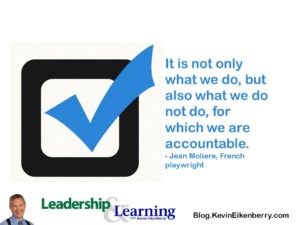 In the training I did this week, the idea inside today’s short quotation came up several times. It is an important idea, and yet one many people haven’t thought of or just don’t do (which is another reason to do it!).
In the training I did this week, the idea inside today’s short quotation came up several times. It is an important idea, and yet one many people haven’t thought of or just don’t do (which is another reason to do it!).
“It is not only what we do, but also what we do not do, for which we are accountable.”
– Jean Moliere, French playwright
Questions to Ponder
– What is on your to-do list?
– What does your list tell you about yourself?
Action Steps
1. Make a to-do list, or if you already have one, take a fresh look at it.
2. Ask yourself how many of the items on your list will truly move your to your goals.
3. Make a new list, titled your not to-do list.
4. Spend as much time with your not to-do list as your traditional to-do list.
My Thoughts
I don’t know the context of Moliere’s quotation, and so I don’t know if what he means is exactly where I have taken this conversation. Regardless, here is a truth – time management is choice management. Moliere gets to this point by telling us we are accountable for all of it.
I’m sure your plate is full – you likely have plenty to do. The question is – am I doing the right stuff to get to where I want to go? Answering this question is the heart of prioritization, yet most people only do half of the prioritization. Most people decide what they need to do next on a list that just continues to grow, never asking the second prioritization question – what needs to go away completely.
What to do?
What not to do?
Shakespeare asked us “To be or not to be”. Moliere begs a different question – “to do or not to do.” Answering the second will determine the answer to the first. Your actions will create your life, a life for which you are accountable.

Hi Kevin, a very interesting post. It gives us a message to think about. One which I confess never have paid attention before. And yet you are right, we are accountable for the thing we don’t do. if you allow me, I’d say sometimes even more accountable. So I’ll keep this post in mind and act on it for sure. Thank you for your thoughtful insights.
Amen! After all, performance is not a function of how much you do or how hard you work, but rather a function of how consistently you do the things that matter most (or in this case, I’d also add ‘how consistently you don’t do the things that matter least!’). Great timeless advice, Kevin!